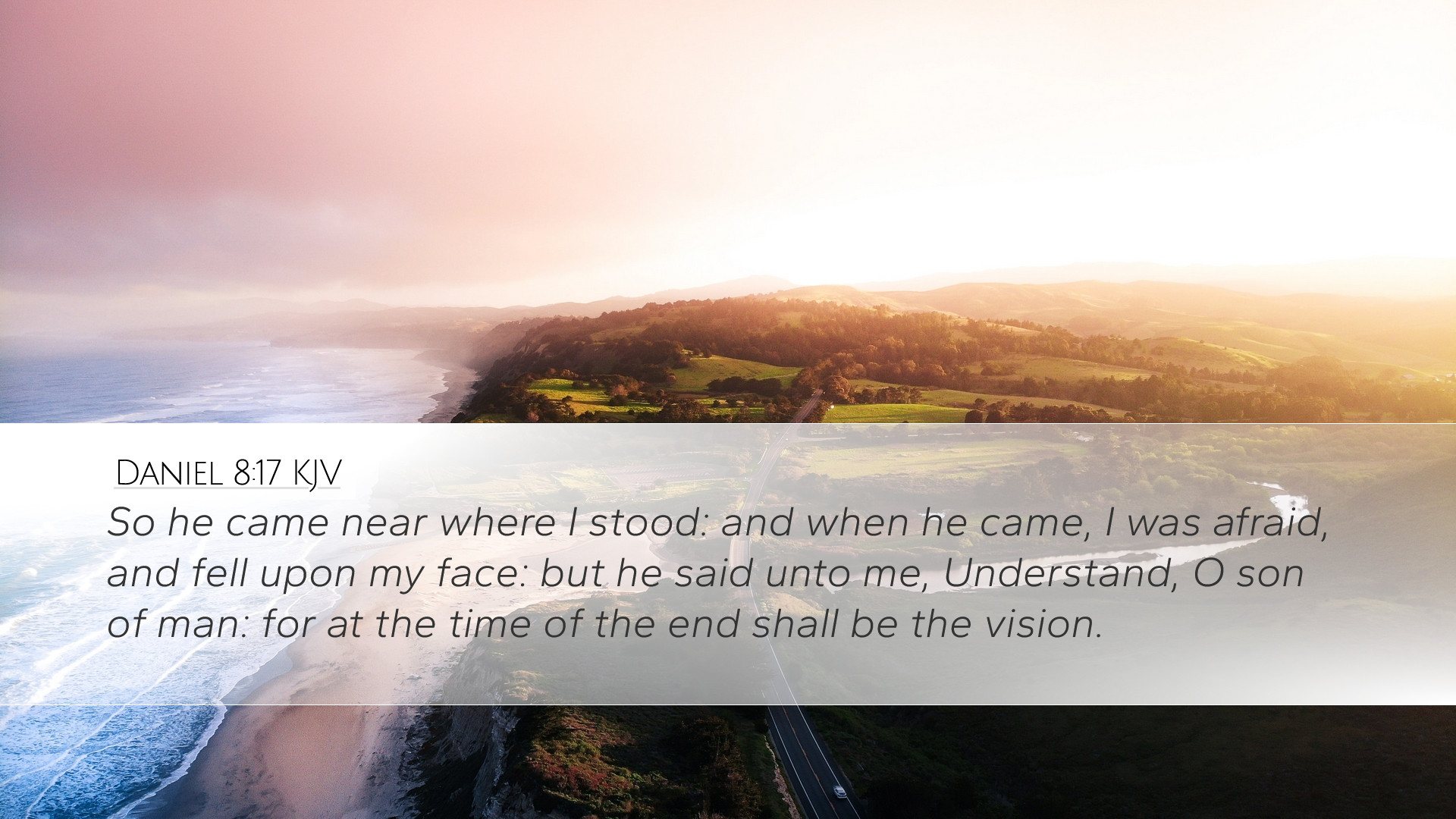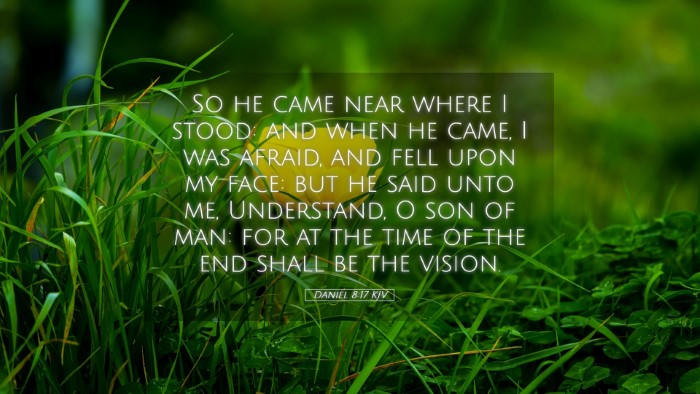Commentary on Daniel 8:17
Verse Context: Daniel 8:17 reads, "So he came near where I stood: and when he came, I was afraid, and fell upon my face: but he said unto me, Understand, O son of man: for at the time of the end shall be the vision."
Introduction
Daniel 8:17 is a pivotal verse within the larger context of the Book of Daniel. It marks a significant moment where the prophet Daniel receives divine revelation concerning future events. This commentary synthesizes insights from various public domain scholarly sources including those of Matthew Henry, Albert Barnes, and Adam Clarke, aiming to enrich the understanding of readers, especially pastors, students, theologians, and scholars.
Analysis of Key Themes
1. The Role of Angels in Revelation
The appearance of the heavenly messenger in this verse reflects the extensive role angels play in communicating God's will to humanity. Matthew Henry notes that the angelic being commands Daniel’s attention, emphasizing the weight and seriousness of the prophetic vision being imparted. The holiness of the messenger and the divine authority he represents provoke a profound fear in Daniel, highlighting the awe-inspiring nature of divine revelation.
2. The Response of the Prophet
Daniel's reaction—falling on his face—indicates a typical response of terror and humility before God and His messengers. Clarke comments on this physical submission, observing that it signifies not only fear but also reverence and acknowledgment of one’s own unworthiness in the presence of divine holiness. This thematic element serves as a reminder to readers about their posture before God’s revelations.
3. Invocation for Understanding
The plea, "Understand, O son of man," reveals a compassionate approach of God towards His servants. Barnes elucidates that this phrase indicates both a call to spiritual discernment and a reassurance that the mysteries being divulged are not merely academic but hold personal significance for Daniel and, by extension, for God's people. The intimate address invites deeper engagement with divine truths.
4. Timing and Eschatological Significance
The phrase "for at the time of the end shall be the vision" points towards eschatological implications. There is a sense here that the revelations are not confined to the immediate context of Daniel's time, but extend to future generations. Henry highlights that "the end" denotes a culmination, a day when God's purposes will be fully realized. This concept of the "end times" has been a point of deep theological reflection, prompting serious exploration among scholars regarding its implications for contemporary believers.
Theological Implications
1. God’s Sovereignty and Revelation
The overarching narrative emphasizes God's sovereignty. The visions given to Daniel illustrate God’s control over history and future events. Both Barnes and Henry affirm that God is not reluctant to disclose His plans; instead, He actively engages with His creation, making known His purposes through prophetic utterance.
2. The Call to Prophetic Understanding
This verse serves as an exhortation for believers to seek deeper understanding of God’s Word and its implications for their lives and circumstances. Clarke's analysis suggests that while the visions contain uncertain elements, the divine intention behind them is for believers to prepare and align themselves with God's unfolding plan. The call to "understand" revolves around a commitment to both intellectual inquiry and spiritual receptivity.
Applications for Today’s Believer
1. Cultivating a Heart of Reverence
Daniel's response encourages modern believers to approach Scripture and the revelations of God with reverence and humility. Recognizing their position before a holy God instills a necessary attitude for genuine worship and understanding.
2. Engaging with Prophetic Literature
In an age filled with uncertainty and competing narratives, a commitment to studying prophetic texts, like Daniel, can fortify the faith of believers. Understanding that these writings were intended to empower and enlighten should encourage pastors and scholars alike to incorporate such teachings into their ministries and lectures.
3. Embracing the Call for Discernment
As the church navigates contemporary challenges, this passage serves as a reminder of the ongoing need for discernment regarding God’s purposes and timing in history. Engagement in prayer and study, as articulated in these commentaries, becomes paramount for aligning with God’s will.
Conclusion
Daniel 8:17 encapsulates a profound exchange between the divine and the prophet, steeped in themes of fear, understanding, and prophetic anticipation. Insights from Matthew Henry, Albert Barnes, and Adam Clarke collectively underscore the richness of this text. For pastors, students, and theologians, the verse not only holds historical significance but also offers ongoing encouragement and challenge as they seek to understand and articulate God’s revelation in their own contexts.


